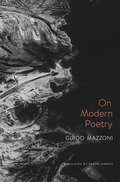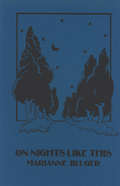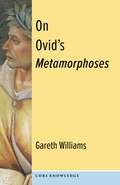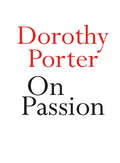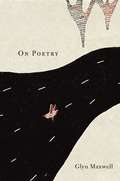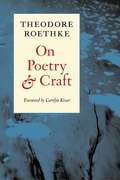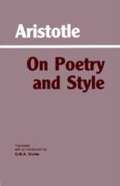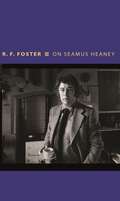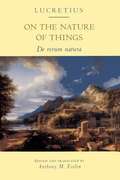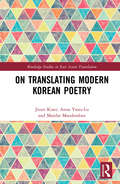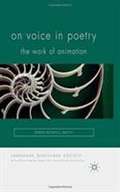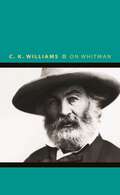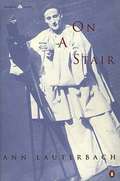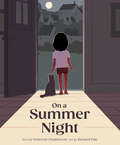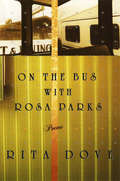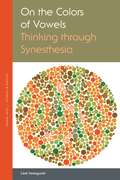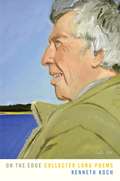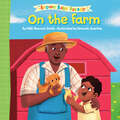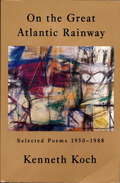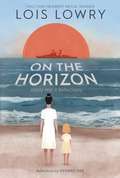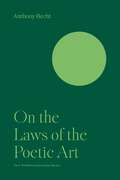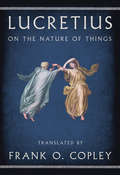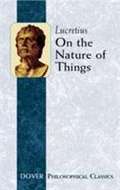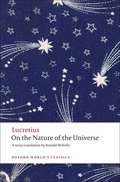- Table View
- List View
On Modern Poetry
by Guido MazzoniAn incisive, unified account of modern poetry in the Western tradition, arguing that the emergence of the lyric as a dominant verse style is emblematic of the age of the individual. Between the end of the eighteenth century and the beginning of the twentieth, poetry in the West was transformed. The now-common idea that poetry mostly corresponds with the lyric in the modern sense—a genre in which a first-person speaker talks self-referentially—was foreign to ancient, medieval, and Renaissance poetics. Yet in a relatively short time, age-old habits gave way. Poets acquired unprecedented freedom to write obscurely about private experiences, break rules of meter and syntax, use new vocabulary, and entangle first-person speakers with their own real-life identities. Poetry thus became the most subjective genre of modern literature. On Modern Poetry reconstructs this metamorphosis, combining theoretical reflections with literary history and close readings of poets from Giacomo Leopardi to Louise Glück. Guido Mazzoni shows that the evolution of modern poetry involved significant changes in the way poetry was perceived, encouraged the construction of first-person poetic personas, and dramatically altered verse style. He interprets these developments as symptoms of profound historical and cultural shifts in the modern period: the crisis of tradition, the rise of individualism, the privileging of self-expression and its paradoxes. Mazzoni also reflects on the place of poetry in mass culture today, when its role has been largely assumed by popular music. The result is a rich history of literary modernity and a bold new account of poetry’s transformations across centuries and national traditions.
On Nights Like This
by Marianne BlugerMarianne Bluger knows what it is to be at sea; oceans of sad and beautiful possibilities wash her poems. And she feels the warmth and fixity of anchorage in home. Tender by nature but tough at need, her language deftly negotiates a course between these poles.
On Ovid's Metamorphoses (Core Knowledge)
by Gareth WilliamsOvid’s Metamorphoses has entranced audiences for two thousand years, from Rome under Augustus to humanities classrooms today. Borrowing liberally from Greek and Roman mythology, the poem tells hundreds of stories that share one essential theme: each tale depicts a transformation from one physical form into another.Drawing on many years of teaching the Metamorphoses, Gareth Williams offers a brisk and lively reading of the poem that emphasizes why it speaks in compelling ways to a twenty-first-century audience. He shows how the Metamorphoses is not just a colorful collection of stories about change but an exploration of change itself. Ovid challenges us to recognize flux as fundamental to human experience: circumstances shift, fortunes ebb and flow, and our very identities ceaselessly evolve across from one life stage to another.Capturing the energy and excitement that Ovid’s poem generates among readers, Williams also sheds new light on its modern provocations. His fresh interpretations of the Metamorphoses reveal its power to enrich and inform our daily existence amid the uncertainties of life today.
On Passion (Little Books On Big Themes Ser.)
by Dorothy Porter'I wonder if some of the most deeply passionate experiences of my life have happened between the covers of a book'A wonderful, ultimately joyous, insight into the creative life of one of our best loved poets.In On Passion celebrated Australian poet Dorothy Porter delves headfirst into the passions, both literary and earthly. We discover the young Dorothy Porter's 'drug of choice' was none other than romantic love and that 'some of the most deeply passionate experiences of [her] life happened between the covers of a book'. Written just before she passed away in 2008, On Passion is a wonderful, ultimately joyous, insight into the creative life of one of our best loved poets.
On Poetry
by Glyn Maxwell"“This is a book for anyone,” Glyn Maxwell declares of On Poetry. A guide to the writing of poetry and a defense of the art, it will be especially prized by writers and readers who wish to understand why and how poetic technique matters. When Maxwell states, “With rhyme what matters is the distance between rhymes” or “the line-break is punctuation,” he compresses into simple, memorable phrases a great deal of practical wisdom. In seven chapters whose weird, gnomic titles announce the singularity of the book—“White,” “Black,” “Form,” “Pulse,” “Chime,” “Space,” and “Time”—the poet explores his belief that the greatest verse arises from a harmony of mind and body, and that poetic forms originate in human necessities: breath, heartbeat, footstep, posture. “The sound of form in poetry descended from song, molded by breath, is the sound of that creature yearning to leave a mark. The meter says tick-tock. The rhyme says remember. The whiteness says alone,” Maxwell writes. To illustrate his argument, he draws upon personal touchstones such as Emily Dickinson and Robert Frost. An experienced teacher, Maxwell also takes us inside the world of the creative writing class, where we learn from the experiences of four aspiring poets. “You master form you master time,” Maxwell says. In this guide to the most ancient and sublime of the realms of literature, Maxwell shares his mastery with us."
On Poetry
by Glyn Maxwell"“This is a book for anyone,” Glyn Maxwell declares of On Poetry. A guide to the writing of poetry and a defense of the art, it will be especially prized by writers and readers who wish to understand why and how poetic technique matters. When Maxwell states, “With rhyme what matters is the distance between rhymes” or “the line-break is punctuation,” he compresses into simple, memorable phrases a great deal of practical wisdom. In seven chapters whose weird, gnomic titles announce the singularity of the book—“White,” “Black,” “Form,” “Pulse,” “Chime,” “Space,” and “Time”—the poet explores his belief that the greatest verse arises from a harmony of mind and body, and that poetic forms originate in human necessities: breath, heartbeat, footstep, posture. “The sound of form in poetry descended from song, molded by breath, is the sound of that creature yearning to leave a mark. The meter says tick-tock. The rhyme says remember. The whiteness says alone,” Maxwell writes. To illustrate his argument, he draws upon personal touchstones such as Emily Dickinson and Robert Frost. An experienced teacher, Maxwell also takes us inside the world of the creative writing class, where we learn from the experiences of four aspiring poets. “You master form you master time,” Maxwell says. In this guide to the most ancient and sublime of the realms of literature, Maxwell shares his mastery with us."
On Poetry and Craft
by Carolyn Kizer Theodore Roethke"One of the virtues of good poetry is the fact that it irritates the mediocre."Theodore Roethke was one of the most famous and outspoken poets and poetry teachers this country has ever known. In this volume of selected prose, Roethke articulates his commitments to imaginative possibilities, offers tender advice to young writers, and zings darts at stuffed shirts, lightweights and fools."Art is our defense against hysteria and death."With the assistance of Roethke's widow, this volume has been edited to include the finest selections from out of print collections of prose and journal entries. Focused on the making and teaching of poetry,On Poetry and Craft will be prized in the classroom-and outrageous Roethke quotes will once again pepper our conversations."You must believe a poem is a holy thing, a good poem, that is."Theodore Roethke was of an illustrious generation of poets which included Sexton, Plath, Lowell, Berryman, and like them he received nearly every major award in poetry, including the Pulitzer Prize and twice the National Book Award. In spite of his fame, he remained a legendary teacher, known for the care and attention he gave to his students, poets such as James Wright, Carolyn Kizer, Tess Gallagher, and Richard Hugo. Roethke died on August 1, 1963, while swimming in a friend's pool."But before I'm reduced to an absolute pulp by my own ambivalence, I must say goodbye. The old lion perisheth. Nymphs, I wish you the swoops of many fish. May your search for the abiding be forever furious."On Poetry and CraftI am overwhelmed by the beautiful disorder of poetry, the eternal virginity of words.The poem, even a short time after being written, seems no miracle; unwritten, it seems something beyond the capacity of the gods.We can't escape what we are, and I'm afraid many of my notions about verse (I haven't too many) have been conditioned by the fact that for nearly 25 years I've been trying to teach the young something about the nature of verse by writing it--and that with very little formal knowledge of the subject or previous instruction. So it's going to be lik
On Poetry and Style
by Aristotle G. M. A. Grube Donald J. ZeylContains the Poetics and the first twelve chapters of the Rhetoric , Book III.
On Seamus Heaney (Writers on Writers #13)
by Roy FosterA vivid and original account of one of Ireland’s greatest poets by an acclaimed Irish historian and literary biographerThe most important Irish poet of the postwar era, Seamus Heaney rose to prominence as his native Northern Ireland descended into sectarian violence. A national figure at a time when nationality was deeply contested, Heaney also won international acclaim, culminating in the Nobel Prize for Literature in 1995. In On Seamus Heaney, leading Irish historian and literary critic R. F. Foster gives an incisive and eloquent account of the poet and his work against the background of a changing Ireland.Drawing on unpublished drafts and correspondence, Foster provides illuminating and personal interpretations of Heaney’s work. Though a deeply charismatic figure, Heaney refused to don the mantle of public spokesperson, and Foster identifies a deliberate evasiveness and creative ambiguity in his poetry. In this, and in Heaney’s evocation of a disappearing rural Ireland haunted by political violence, Foster finds parallels with the other towering figure of Irish poetry, W. B. Yeats. Foster also discusses Heaney’s cosmopolitanism, his support for dissident poets abroad, and his increasing focus in his later work on death and spiritual transcendence. Above all, Foster examines how Heaney created an extraordinary connection with an exceptionally wide readership, giving him an authority and power unique among contemporary writers.Combining a vivid account of Heaney’s life and a compelling reading of his entire oeuvre, On Seamus Heaney extends our understanding of the man as it enriches our appreciation of his poetry.
On The Nature Of Things
by Lucretius Anthony M. EsolenTitus Lucretius Carus was probably born in the early first century B.C., and died in the year 55. Little is known of his life, although two tantalizing bits of gossip were passed on by St. Jerome: that he was poisoned by a madness-inducing aphrodisiac given him by his wife, and that his great poem On the Nature of Things was posthumously edited by Cicero. For the latter assertion, writes Anthony Esolen in his introduction to the present volume, there is little evidence, and none whatsoever for the former.
On Translating Modern Korean Poetry
by Jieun Kiaer Anna Yates-Lu Mattho ManderslootOn Translating Modern Korean Poetry is a research monograph exploring the intricacies and complexities of translating modern Korean poetry. This monograph highlights the difficulties entailed in translating Korean poetry, due to the lexical, structural, social, expressive and attitudinal levels with which the translator must be engaged. Featuring all-new translations, this book explores the question of what exactly modern Korean poetry is, increases the representation of female poets and includes poems addressing modern historical events, globalization, diaspora and mental health. Each chapter provides commentary on both the original and translated texts and looks at some of the issues that arose during the translation process. By doing so the authors draw attention to the intricate, trans-cultural and trans-creational process of Korean poetry translation. Collating contemporary Korean poetry and intricately exploring the translation process, this book is ideal for researchers and advanced level students of Korean Studies, Translation Studies and Literature with an interest in translation.
On Voice in Poetry
by David Nowell SmithWhat do we mean by 'voice' in poetry? In this work, David Nowell Smith teases out the diverse meanings of 'voice', from a poem's soundworld to the rhetorical gestures through which poems speak to us, in order to embark on a philosophical exploration of the concept of voice itself.
On Whitman (Writers on Writers #8)
by C. K. WilliamsPulitzer Prize–winning poet C. K. Williams's personal reflection on the art of Walt WhitmanIn this book, Pulitzer Prize–winning poet C. K. Williams sets aside the mass of biography and literary criticism that has accumulated around Walt Whitman and attempts to go back to Leaves of Grass as he first encountered it—to explore why Whitman's epic "continues to inspire and sometimes daunt" him. The result is a personal reassessment and appreciation of one master poet by another, as well as an unconventional and brilliant introduction to Whitman. Beautifully written and rich with insight, this is a book that refreshes our ability to see Whitman in all his power.
On a Stair
by Ann LauterbachAnn Lauterbach's fifth collection takes its title from Emerson's great essay, Experience: "Where do we find ourselves?" he asks. Lauterbach's stair sits precariously between a quest for spiritual vitality and a sense of the overwhelming materiality of our world. Identifying with the clown, the nomad and the thief figures whose ghostly marginality haunt this book, Lauterbach brings us, with a dazzling range of formal and imagistic resources, to a new understanding of how language inscribes the relationship between self-knowledge and cultural meaning. .
On a Summer Night
by Deborah HopkinsonStep into the quiet magic of this celebration of summer nighttime and the mystery of a world lit differently by the moon.On a summer night, the world is still. Even the crickets think it’s too hot to sing. But all at once, a girl wakes. In the kitchen, the cat rolls onto its soft paws. A neighbor’s small white dog yaps, a brown rabbit peeks from a hedge, and the leaves of a cherry tree begin to stir in the breeze. Readers witness and wonder: Who has woken them all? In this soothing bedtime story, the quiet of a warm summer night is brought to vivid, magical life with the soft steps of bare feet, the padding of paws, and the bright, golden light of the moon. One by one, each creature is roused and then gently returned to sleep in a lovely and lyrical exploration of wakefulness, restfulness, and the mysterious calm of the night.PERFECT FOR BEDTIME . . . OR ANYTIME: This beautifully illustrated children's book is ideal for soothing young readers to sleep—or encouraging a contemplative break in an energetic day. The story’s engagement with the wonders of nighttime will help children feel comforted by the dark and the prospect of going to sleep rather than afraid of them.READ-ALOUD READINESS: With its lyricism and short refrains, this gentle story is just right for sharing.CONNECTION TO NATURE: This magical book gradually reveals the moon as a character as it wakes girl, cat, dog, rabbit, tree, air, and cloud in turn—and connects them to one another through the welcoming quiet and wonder of a world gilded by moonlight.THE POWER OF SLOWING DOWN: Picture books are often wonderful excuses to slow down and share a moment of gentleness in kids' (and parents') busy lives; this book feels like a deep breath and offers a chance to wonder and reflect.Perfect for:Kids who can't sleep on hot summer nightsParents, grandparents, and caregivers seeking a sweet bedtime bookLibrarians and storytime leaders looking for a summer read-aloudGift givers who want to share a beautiful, lyrical book with someone specialReaders of such classic bedtime stories for kids as Goodnight Moon and The Going to Bed Book
On the Bus with Rosa Parks: Poems
by Rita DoveA dazzling new collection by the former Poet Laureate of the United States. In these brilliant poems, Rita Dove treats us to a panoply of human endeavor, shot through with the electrifying jazz of her lyric elegance. From the opening sequence, "Cameos", to the civil rights struggle of the final sequence, she explores the intersection of individual fate and history.
On the Colors of Vowels: Thinking through Synesthesia (Verbal Arts: Studies in Poetics)
by Liesl YamaguchiTreatments of synesthesia in the arts and humanities generally assume a clear distinction between the neurological condition and the literary device. Synesthetes’ descriptions of colors seen in connection with music, for example, are thought to differ fundamentally from common expressions that rely on transpositions across sensory dimensions (“bright vowels”). This has not always been the case. The distinction emerged over the course of the twentieth century, as scientists sought to constitute “synesthesia” as a legitimate object of modern science.On the Colors of Vowels investigates the ambiguity of visual descriptions of vowels across a wide range of disciplines, casting several landmark texts in a wholly new light. The book traces the migration of sound-color correspondence from its ancient host (music) to its modern one (vowels), investigating the vocalic Klangfarben of Hermann von Helmholtz’s monumental Sensations of Tone, the vowel colors reported in early psychology surveys into audition colorée (colored hearing), the mis-matched timbres that form poetry’s condition of possibility in Stéphane Mallarmé’s “Crisis of Verse,” and the vowel-color analogy central to both the universal alphabets of the nineteenth century and the phonological universals of the twentieth. The book’s final chapter turns to an intricately detailed account of vowel-color correspondence by Ferdinand de Saussure, suggesting how the linguist’s sensitivity to vowel coloration may have guided his groundbreaking study of Indo-European vocalism.Bringing out the diverse ways in which visual conceptions of vowels have inflected the arts and sciences of modernity, On the Colors of Vowels makes it possible to see how discourses of the nineteenth and twentieth centuries crafted the enigma we now readily recognize as “synesthesia.”
On the Edge: Collected Long Poems
by Kenneth KochIn paperback for the first time: Kenneth Koch's six masterly, groundbreaking longer poems, which contain some of the poet's most original work, full of exclamation and exaggeration but graced as well with dry wit and sophistication. Together they serve as the companion volume to the highly praised Collected Poems of Kenneth Koch.From the Trade Paperback edition.
On the Farm: A Brown Baby Parade Book (Brown Baby Parade)
by Nikki Shannon SmithThere is a lot to do on the family farm! Read along in this sturdy board book perfect for children ages 0-3 as a boy helps his grandfather in this next installment of the Brown Baby Parade series.Papa&’s farm is big.There&’s so much work to do!Papa smiles and says,&“I like to work with you!&”A little boy helps his grandpa weed the garden, feed the chicks, fix a fence to stop escaping goats, and so much more in this sweet story. Nikki Shannon Smith's soothing, rhythmic text and Amanda Quartey's warm, welcoming illustrations pair beautifully to create heartwarming scenes of everyday life. The joyful depiction of Black rural life will allow children to see themselves and encourage interest in their local farming communities!
On the Great Atlantic Railway
by Kenneth KochOn the Great Atlantic Railway is Kenneth's Koch's inspired collection of 32 years of work. Koch, David Lehman said in The American Poetry Review, is "a masterly innovator . . . who has used his extravagant powers of wit and invention to enlarge the sphere of the poetic . . . he has stretched our ideas of what it is possible to do in poetry."
On the Horizon
by Lois LowryFrom two-time Newbery medalist and living legend Lois Lowry comes a moving account of the lives lost in two of WWII&’s most infamous events: Pearl Harbor and Hiroshima. With evocative black-and-white illustrations by SCBWI Golden Kite Award winner Kenard Pak. Lois Lowry looks back at history through a personal lens as she draws from her own memories as a child in Hawaii and Japan, as well as from historical research, in this stunning work in verse for young readers.On the Horizon tells the story of people whose lives were lost or forever altered by the twin tragedies of Pearl Harbor and Hiroshima. Based on the lives of soldiers at Pearl Harbor and civilians in Hiroshima, On the Horizon contemplates humanity and war through verse that sings with pain, truth, and the importance of bridging cultural divides. This masterful work emphasizes empathy and understanding in search of commonality and friendship, vital lessons for students as well as citizens of today&’s world. Kenard Pak&’s stunning illustrations depict real-life people, places, and events, making for an incredibly vivid return to our collective past. In turns haunting, heartbreaking, and uplifting, On the Horizon will remind readers of the horrors and heroism in our past, as well as offer hope for our future.
On the Laws of the Poetic Art (The A. W. Mellon Lectures in the Fine Arts #41)
by Anthony HechtA magisterial exploration of poetry’s place in the fine arts by one of the twentieth century's leading poetsIn this book, eminent poet Anthony Hecht explores the art of poetry and its relationship to the other fine arts. While the problems he treats entail both philosophic and theoretical discussion, he never allows abstract speculation to overshadow his delight in the written texts that he introduces, or in the specific examples of painting and music to which he refers. After discussing literature’s links with painting and music, Hecht investigates the theme of paradise and wilderness, especially in Shakespeare’s The Tempest. He then turns to the question of public and private art, exploring the ways in which all the arts participate in balances between private and public modes of discourse, and between an exclusive or elitist role and the openly political. Beginning with a discussion of architecture as an illustration of a more general theme of discord and balance, the penultimate lecture probes the inner contradictions of works of art and our reactions to them, while the final piece concerns art and morality.
On the Nature of Things
by Lucretius Frank O. CopleyReissued to accompany Stephen Greenblatt's The Swerve: the epic poem that changed the course of human thought forever. This great poem stands with Virgil's Aeneid as one of the vital and enduring achievements of Latin literature. Lost for more than a thousand years, its return to circulation in 1417 reintroduced dangerous ideas about the nature and meaning of existence and helped shape the modern world.
On the Nature of Things
by Lucretius W. E. LeonardThe Roman philosopher's didactic poem in 6 parts, De Rerum Natura -- On the Nature of Things -- theorizes that natural causes are the forces behind earthly phenomena and dismisses divine intervention. Derived from the philosophical materialism of the Greeks, Lucretius' work remains the primary source for contemporary knowledge of Epicurean thought.
On the Nature of the Universe
by Lucretius Ronald Melville Don Fowler Peta FowlerThis is a new verse translation of Lucretius's only known work, a didactic poem written in six books of hexameters. Melville's particularly literal translation of the use of metaphor is especially helpful to those looking at the text from a scientific or philosophical point of view. About the Series:For over 100 years Oxford World's Classicshas made available the broadest spectrum of literature from around the globe. Each affordable volume reflects Oxford's commitment to scholarship, providing the most accurate text plus a wealth of other valuable features, including expert introductions by leading authorities, voluminous notes to clarify the text, up-to-date bibliographies for further study, and much more.
